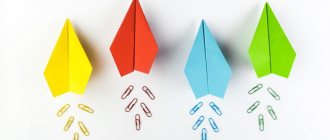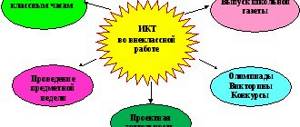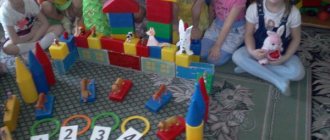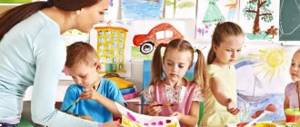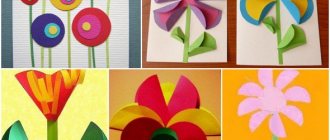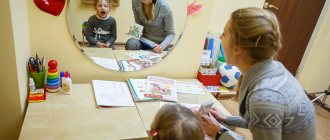Greetings to everyone who is interested in pedagogical issues! Your Sukhikh Tatyana continues to inform you about the intricacies of working in kindergarten and beyond. Today we will analyze the teacher’s self-analysis into its components: what it is and how to correctly compose this document.
It’s interesting that I already wrote about self-analysis by a psychologist, speech therapist, and some lessons in elementary school, but I forgot to talk about self-assessment of my own activities. Today I will correct this unfortunate omission on my part. I hope my fellow educators will respond and share their experience of how they write such documents.
I won’t say that there is now more writing in kindergarten than there was 10 years ago, but new requirements and new types of mandatory documentation have appeared. How many of you like to write reports, plans, etc.? I think not many. To make life easier for myself and my colleagues, I decided to tell you in detail what needs to be taken into account when compiling a self-analysis for a kindergarten teacher.
So, I’ll start with useful, in my opinion, teaching materials that are better to buy in printed form to always keep at hand at your workplace.
New exhibits for the teacher’s methodological treasure chest
The wonderful online store “UchMag” pleased me with an excellent offer: you can take part in the offline seminar “Map of the effectiveness of the professional activity of a teacher. Self-analysis” - for a symbolic price you will receive interesting information for use, and you will also be able to ask questions to professionals at any time and receive comprehensive answers.
You can put the “Teacher’s Portfolio” manual on your bookshelf - this is a collection of recommendations, documents, materials that should fill the folder of a teacher’s professional achievements, including advice on compiling a self-analysis according to the Federal State Educational Standard.
It will also be useful to you - there is an interpretation of all the key terms and concepts related to the activities of a teacher.
In addition, our activities require constant reporting, which requires the Journal of the preschool teacher.
If you have the opportunity to use a computer or tablet at work, I advise you to buy the program “Audit of personal qualities and professional competencies of preschool teachers. Diagnostic journal". This program will be useful not only for each individual kindergarten teacher, but also for the manager, who will be able to analyze the professionalism of the team as a whole and correct any shortcomings.
Why does a preschool teacher need self-analysis?
This document is like a teacher’s identity card. By self-analysis, you can evaluate the professionalism of the teacher, the ability to see, analyze your own pros and cons as a specialist, and also plan the further growth of your skills.
According to the new requirements, you must submit your portfolio for certification, which also includes a self-analysis of your teaching activities during the period between certifications. It is especially difficult to write this document for the first time, when certification for the first category is expected.
To make your task easier, try to simply answer a few important questions:
- Who is the community of children I work with? Here you can write about the number of students, their age, whether there are new children, what the general atmosphere is in the group, etc.
- What goals and objectives do I set for myself as a teacher, what do I plan to do in a year? General goals are listed: creating a favorable environment for the comprehensive development of each child, developing creative abilities. Also ensuring health, physical development, mental and emotional well-being.
- If you have a specific problem in the group, then you need to write about it. For example, the team did not accept the new child or the new child cannot adapt to the team. What did you plan to do about the problem?
- What conditions do you work under? It is necessary to characterize the material and technical base, teaching materials, teaching aids, etc. What materials have you personally developed and what have you purchased for the group?
- What topics have you studied in advanced training courses? Tell us where and what you learned.
- Tell us how you understand the essence of the educational process that you organize. Here you can start thinking about the meaning of your work in general and for specific tasks in particular.
- How do you control the results of your activities? Here describe diagnostics, testing, etc. You can provide a sample questionnaire or diagnostic if you developed it yourself.
- What activities have you held with students and their parents? What goals did you set and did you achieve the intended results? If you have a self-reflection on a specific lesson, you can use it as an insert.
- What problems did you face during the analyzed period? This could be a misunderstanding with parents, conflict situations between children, perhaps friction with colleagues or poor material and technical resources of the group.
- How did you solve the problems? Here you need to specifically describe ways to resolve conflicts and other problematic situations.
- What is the name of your self-education topic? What have you done to educate yourself over the past period?
Self-analysis of the pedagogical activity of primary school teacher Ryzhova T.S.
Self-analysis of teaching activities
primary school teacher Ryzhova T.S.
Students with disabilities suffer from underdeveloped speech and find it difficult to communicate due to poor vocabulary. They do not know how to construct sentences correctly and distribute them as secondary members of the sentence. They have problems with sound pronunciation. All this prevents them from mastering knowledge and skills at school.
Having learned the task and methodological theme of the school
: “Modern educational technologies for the formation of UDL in mentally retarded students”, chose
the topic of self-education
: “Methods and techniques for the formation of communicative-speech UUD in primary school students in Russian language lessons, reading and speech development.”
I thought through and began to use the following educational technologies in my work, which
contributed to the formation of communicative speech UUD:
- Technology for productive reading.
Purpose of technology
: formation of reading competence of schoolchildren. The need to improve competent reading, to educate a reader who has a strong reading habit, who knows books, and knows how to choose them independently.
The technology ensures students' understanding of the text by mastering the techniques of its development at the stages before reading, during reading and after reading. This technology is aimed at creating communicative
universal educational actions, ensuring the ability to interpret what is read and formulate one’s position, adequately understand the interlocutor (author), the ability to consciously read textbook texts aloud and silently;
cognitive
universal learning activities, for example, the ability to extract information from text.
With the help of works accessible to age and intelligence, I tried to develop the oral and written speech of students, enriching and activating their vocabulary. She taught students to form monologue and dialogic speech, taught them to evaluate a friend’s answer using an algorithm compiled by the teacher.
Working according to the algorithm that the teacher helped to use, the answer was complete. But students cannot use the algorithm independently. I plan to teach this for the next school year.
It was possible to instill in the student an interest in reading, a desire to learn new things through a book, and to tell friends and family about it. O. didn't learn. We should continue to work on this.
Used
- activity type technology
– work of students in small groups, pairs and other
forms of group work
.
Purpose of technology
- the formation
of communicative
universal educational actions and, above all, the ability to convey one’s position to others, understand other positions, negotiate with people and respect the position of others.
This technology did not produce a positive result. Due to the lack of vocabulary, the guys did not learn to convey to their interlocutor what they wanted to hear from him, and did not learn to negotiate when working together. But they began to respect the opinions of other people.
Used successfully
- gaming technologies: role-playing game, board game, didactic game and others;
- art technologies.
I tried to use problem-dialogical technology.
Purpose of technology
: teach students to pose and solve problems.
Primary school students with mental retardation are not yet able to set goals and objectives for themselves. I taught them this in third grade.
In accordance with this technology, during the lesson of introducing new material, two parts were worked out: posing an educational problem and searching for its solution.
Formulation of the problem
– This is the stage of formulating a lesson topic or research question. The topic of the lesson was formulated using the games “Say a word”, “Third or fourth extra”, “Make words from the first sounds”, etc. Students love to play and actively participated in formulating the topic.
Finding a solution
– the stage of formulating new knowledge. But the students could not cope with this and the teachers are not satisfied with this.
Therefore, the use of this technology with the previously set goal will continue for the next academic year.
Students in the third grade learned to participate in dialogue in class, but did not learn this in life situations, learned to answer the teacher’s questions using words from the question in the answer, learned to observe the simplest norms of speech etiquette: say hello, say goodbye, thank you.
There is an inability to listen and understand the speech of others. We need to continue to work on this.
Open lessons were held:
Russian language_____________________________________
reading_____________________________________________
development of oral speech based on the study of the surrounding reality_______________________________________________
mathematicians
She spoke at meetings of methodological associations and teachers' councils. Participated in organizing active teaching practice for students in September-October and February. I have published articles and methodological developments on various sites: Info-lesson, Pedagogical Piggy Bank, Globe and others. The result of participation in the competition will be known in May.
posed to me :
“Introduction into practice of modern active methods and techniques for the formation of communicative learning skills in Russian language lessons, reading and speech development in primary school,” the
purpose
of which was to promote the formation of communicative speech learning skills through the introduction of educational technologies; the use of ICT in the classroom and in extracurricular activities to increase school motivation for the subject; the development of students’ speech competence and maintaining their interest in reading, based on the knowledge gained in Russian language lessons, speech development, culture of behavior, life safety, was not fully resolved this academic year.
For the 2015-2016 academic year I will continue to work on the methodological problem:
“Introduction into practice of modern active methods and techniques for the formation of communicative learning skills in Russian language lessons, reading and speech development in primary school” and will continue to develop methodological recommendations, didactic materials within the framework of the self-education topic “Methods and techniques for the formation of communicative speech learning skills in primary school students in Russian language lessons, reading and speech development.”
Tasks
for the 2015-2016 academic year
1. Develop students’ oral and written speech, enriching and activating their vocabulary with the help of works accessible to age and intelligence;
2. Form monologue and dialogic speech of students, teach them to evaluate a friend’s answer using an algorithm compiled by the teacher;
5. Cultivate in the student an interest in reading, a desire to learn new things through a book and tell friends and family about it;
6. Continue the introduction of innovative technologies and methods in teaching the Russian language, reading and speech development, thereby increasing the scientific and theoretical level in the field of theory and methods of teaching the Russian language and literature.
Expected results:
Students:
- increasing the academic performance and level of learning of students, motivation to study the subject;
- formation of the student’s internal position at the level of a positive attitude towards school, understanding of the need for learning, the ability to self-esteem, the ability to plan, control one’s actions, formulate one’s own opinion, cooperate with any partner, and search for the necessary information.
The student will learn:
Communicative UUD
1. Participate in dialogue in class and in life situations.
2. Answer questions from the teacher and classmates.
3. Observe the simplest norms of speech etiquette: say hello, say goodbye, thank you.
4. Listen and understand the speech of others.
5. Participate in pairs.
Teacher:
- development and conduct of open lessons, master classes, generalization of experience on the topic under study;
- development, testing and reviewing of teaching aids, articles, scenarios for extracurricular activities using ICT at PGSGA
- development and testing of didactic materials, tests, visual aids, creation of an electronic set of pedagogical developments;
- development of work programs in subjects in accordance with Federal State Educational Standards
- improving the quality of taught subjects;
- participation in teacher councils, seminars, and in the work of school education organizations for primary school teachers;
- ability to provide practical assistance to colleagues
Sources of self-education:
Media, including:
- special literature (methodological, popular science, journalistic, fiction),
- Internet;
- media information on various media;
- seminars, conferences, lectures, experience exchange events, master classes,
- excursions, theaters, exhibitions, museums
How to end self-analysis?
At the end of the self-analysis, it is appropriate to talk about your awards - certificates, diplomas, gratitude and smoothly move on to summarizing the above. If you are applying for the highest category, it would be good to present a plan to improve your own professionalism for the future certification period.
Also list your strengths and weaknesses as a specialist and as an individual and tell us how you are working on yourself. Perhaps there are specific obstacles to your professional growth, you can indicate them.
If we say in one sentence about the essence of self-analysis, then we can do this: you must describe your purposeful work with children, parents, interaction with colleagues and your role in the microsociety (kindergarten).
In general, self-analysis is written in free form, there are no strict canons. But the key points listed above must be present so that you can count on a positive assessment of your activities by the commission.
If you have questions, do not hesitate to ask, I will definitely answer in detail!
Show my article to your friends, if there are educators among them, just click on the social network icons. Also subscribe to new materials, I will try to make my blog interesting for everyone!
Sincerely, Tatyana Sukhikh! Till tomorrow!
By the way, I recommend reading:
Self-analysis of the professional activity of a teacher.
"The best way to raise good
children is to make them happy."
O. Wilde
I, Fomina Natalya Viktorovna, have been working at preschool educational institution No. 6 since January 2005. 13 years of teaching experience: 3 years as a physical instructor and 10 years as a teacher.
According to the 2009 certification, he was assigned the 9th tariff category for the position of teacher.
She completed three pedagogical educations:
2002 - Makeevka Pedagogical School. Specialty: Primary Education.
2010 - Miners Pedagogical School. Specialty "Preschool education".
2014 - Berdyansk State Pedagogical University. Specialty "Preschool education", qualification "Organizer of preschool education, teacher of preschool children, practical psychologist."
From the first day this work has become a part of my life, I know that I want and can give a lot to children, but they give me much more!
The main goal of my professional activity is to ensure the organization of pedagogical support for the activities of children, which allows for the educational and educational process, taking into account the individual characteristics of children, creating conditions for the full development, strengthening and maintaining the health of children, preparing for school.
I build the educational process with children on the basis of the “From Birth to School” Program by N.E. Veraksa, T.S. Komarova, M.A. Vasilyeva.
In modern conditions: the introduction of state educational standards and the modernization of education, first of all, teachers need to restructure. Educate yourself, use modern technologies, share experiences. Today, one might say, teachers are pioneers. To do this, I created my own mini-site on the “Social Network of Education Workers”, where I posted my electronic portfolio. On the site I share my experience and best practices, as well as draw from the experience of others.
I take an active part in the life of the kindergarten. I participate in matinees and entertainment in my own and in other groups, and acted as a presenter at entertainment for all the children in our kindergarten.
Advanced training, the introduction of modern educational technologies and methods, such as the project method, allowed me to improve the teaching process in accordance with new requirements.
I have been working with children for 13 years. As a teacher, I was faced with such tasks as: the formation of a child’s personal qualities, the development of attention, memory, speech, instilling cultural communication skills, the ability to conduct a dialogue with an adult, communicate with peers, ensuring the comprehensive development and self-development of the student.
The group in which I work has a general developmental focus, which involves the general development of the intellectual, physical and creative abilities of children. During observation of children, it turned out that most children do not have a developed sense of empathy and respect for living nature. The relationships between natural phenomena are poorly developed. While the role of nature is very important in the spiritual life of society. Nature is the entire Universe with the organic (living) and inorganic (non-living) world existing in it.
Communication with nature, knowledge of its secrets ennobles a person, makes him more sensitive. Knowledge of nature, penetration into its cause-and-effect relationships between objects and phenomena develops thinking and the ability to form a scientific worldview. The educational value of nature is difficult to overestimate.
Therefore, I chose and am conducting in-depth work on the topic “Ecological education of children through didactic games.” The goal that came to the fore for me was to introduce preschoolers to nature through familiarization with it.
For this purpose, the project method was used. I have also developed and continue to improve the didactic game “Seasons.” The goal of my in-depth work is to develop in children a cognitive, emotional, moral, practical, active, aesthetic attitude towards the environment.
The group has created a developmental environment that stimulates a wide variety of child activities. To identify the results of the effectiveness of my work in the chosen direction, I conducted environmental knowledge quizzes “Little Lynx” and “Ready for School! The World Around You” where the children showed excellent results.
An important part of my work is also working with parents. In order to form their active position, I use the following forms and methods of work: parent meetings, consultations, open classes, participation in organizing and holding holidays, individual conversations, a parent corner is also organized in the reception area, where not only organizational information is placed, but also various consultations for parents.
Exhibitions of crafts such as:
"Golden Autumn"
"Winter Enchantress"
"Spring is red!"
“Ah, summer!”
However, we live in the 21st century! And you can’t go anywhere without information and computer technologies (ICT)! Many parents find it much more interesting and easier to convey information via the Internet. Therefore, on the social network VKontakte I created the group “Preschool educational institution “Thumbelina” group Romashka” to communicate with parents. In this group, parents learn about the life of children in kindergarten. How walks, direct educational activities, free activities, etc. go. In the form of a photo and video report.
But I also use ICT in working with children: videos, presentations, photographs and illustrations... A modern child perceives information “from the screen” much better. In the era of mobile phones, tablets, and computers, it is very difficult to surprise with printed illustrations.
I systematically work to form the foundations of hygienic skills and knowledge, a healthy lifestyle, and ensure life safety. To preserve and strengthen the health of children in kindergarten.
I try to be a partner for children in all types of activities. Since children have different levels of development, I monitor children’s knowledge and skills twice a year in order to identify the level of mastery of the program and correctly plan work taking into account individual characteristics.
I have friendly relations with my colleagues. I am ready to learn from the experience of my colleagues and am happy to share my experience.
In my work I experience the following difficulties: an insufficient amount of methodological literature, toys and manuals for various types of games, construction sets, and board games.
The profession of a teacher is as difficult as it is interesting! The teacher is always young because he never said goodbye to childhood. This is constant work on oneself, self-education. After all, before you give something to children, you must let it pass through yourself! The teacher should be an equal participant in the game, rejoice and be sad with the children!
Kindergarten is truly a different world – the world of children, childhood!
